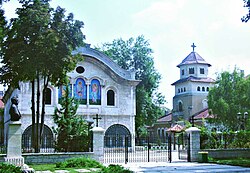Dobrich
|
Dobrich Добрич |
||
|---|---|---|

The Church of Saint George
|
||
|
||
| Location of Dobrich | ||
| Coordinates: 43°34′N 27°50′E / 43.567°N 27.833°E | ||
| Country | Bulgaria | |
|
Province (Oblast) |
Dobrich | |
| Government | ||
| • Mayor | Yordan Yordanov | |
| Area | ||
| • City | 109.018 km2 (42.092 sq mi) | |
| Elevation | 225 m (738 ft) | |
| Population (2012) | ||
| • City | 90 375 | |
| • Urban | 112,203 | |
| Time zone | EET (UTC+2) | |
| • Summer (DST) | EEST (UTC+3) | |
| Postal Code | 9300 | |
| Area code(s) | 058 | |
| Website | Official website | |
Dobrich (Bulgarian: Добрич) is the eight most populated city in Bulgaria, the administrative centre of Dobrich Province and the capital of the region of Southern Dobrudzha. It is located in the northeastern part of the country, 30 km west of the Bulgarian Black Sea Coast, not far from resorts such as Albena, Balchik, and Golden Sands. In January 2012, Dobrich was inhabited by 90,375 people within the city limits, while along with the legally affiliated adjacent villages the population was 112,203 inhabitants. The city is named after the Bulgarian medieval lord of the surrounding region - Dobrotitsa. Agriculture is the most developed branch of the economy.
Dobrich Knoll on Livingston Island in the South Shetland Islands, Antarctica is named after Dobrich. A point of interest is the Dobrich TV Tower.
The city is named after the 14th-century Dobrujan ruler Dobrotitsa, from the Slavic root dobr, "good"
The first evidence of settlement in what is now Dobrich dates from the 4th or 3rd century BC. Under the Latin name Abrittum, it was a city of the Roman province of Moesia Inferior, important enough to become a suffragan bishopric of the Metropolitan of the capital, Marcianopolis, but the Catholic diocese faded later. Ruins from 2nd to 4th centuries AD and the 7th to 11th centuries have also been found, including a Bulgar necropolis featuring pagan graves in the centre of the city.
...
Wikipedia


